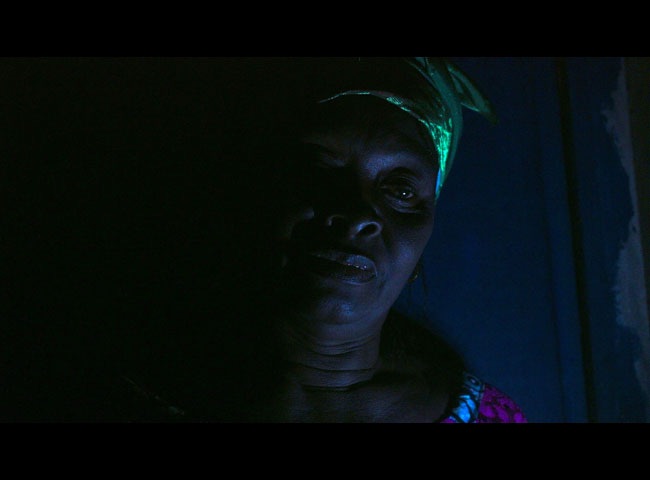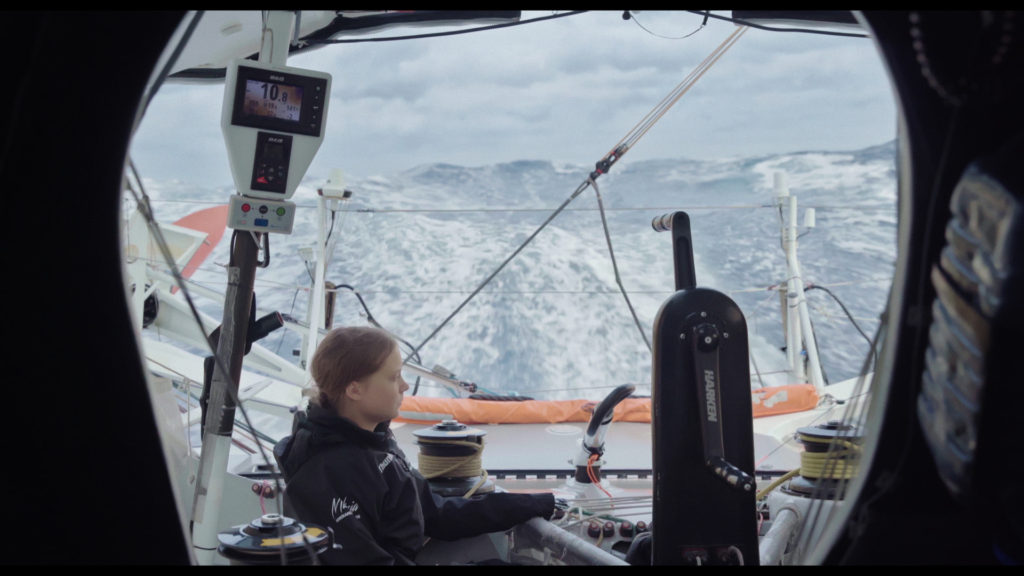Reflections 8
The children don’t watch TV anymore. That’s what the woman onscreen says. Her image is repeated in triplicate across my laptop. I’m sat on my sofa, cosy, under a blanket, with headphones on, a biscuit in hand – a floor lamp casts a warm glow across the floor next to me – watching and listening to her experience of no electricity as if it were a normal part of my comfortable, well-lit Sunday night.
Nelson Makengo’s Nuit Debout (Up at Night, 2019) visits a neighbourhood in Kinshasa (Democratic Republic of Congo) where electric cables are constantly cut and light after dark is a scarcity that breeds hope. The image, repeated three times, amplifies the woman’s voice so that she represents the many and so that we are unable to shift our gaze. Originally intended as a photography project, the film, on my small screen, screams out for a gallery; “let me surround you, so that you see light through the experience of darkness,” it implores. My floor lamp on, even though I don’t need it to be, I am far too comfortable and luxuriating in my own excess. The world is gross, its inequality grosser.

Cables, flashlights, and spot lit faces appear. There is a close-up on fuel being poured into a generator. It is the most well-lit image in the film. It is repeated throughout, like a punctuating beat, three times. The repetition, three by three, feels like a structure being built around me; no fourth wall to break, it is alive in its address, unflinching and unfinished. Hands scrabble around to find working battery-operated lights. They are cheap and come by the bag full. The plastic bag is bursting – with lights that don’t work, I think. On the bag is Barak Obama’s face and his surname in caps. Stretched so that he appears to be laughing rather than smiling, the bag lights the way to bad puns; who is in charge of the world? and how do we face its pervasive neoliberalism?
What does it mean to be in the dark? To be disconnected? Perhaps a battery is the ultimate symbol of mortality; the lives that make up social injustice presented as politics are not renewable and the system that controls it is not sustainable. Makengo contemplates society but presents us with a democracy that has elected God, “It is impossible for God to redeem an ignorant person,” we are told. But who gets to be God as it is written in law? And though they ask, “May God bless the Democratic Republic of Congo,” I cannot think, “Let there be light,” but, instead, I wonder, “Where is the big bang?”
Fireworks answer my call and, like both a celebration and an explosive spark that burns bright for just a moment before fizzling out into little more than a meek display of the wasted energy of our spectacle-driven lives, they disappear until darkness once again engulfs the screen. Darkness is always waiting, taking up space, and not at all bothered about stretches of time. It is the light that must catch up; it is the light that runs.
Nuit Debout was filmed while the Inga 3 Dam was being built, in the most ambitious hydropower scheme in the world, The Grand Inga hydroelectric project, which promises permanent power for the DRC. But just how fast, in a neoliberal economy, is the speed of light?
This week, West Cumbria Mining in the UK announced its plan to open a new coalmine. It is the first in thirty years to be given the green light. Extinction Rebellion’s protests that it goes against the UK’s pledge to be carbon neutral by 2050 have failed to stop it. The counter argument is that the UK will then import less coal from the US.
This week, a so-called debate took place on the world stage. It has been described as “an old man arguing with a toddler.” Who is in charge of the world? And how do we face its pervasive neoliberalism?

As climate activist Greta Thunberg discovers in Nathan Grossman’s doc, I Am Greta (2020), the people in charge can feign listening but they don’t act upon it, even when they are faced with urgency and hope that is born of despair. It’s Greta’s hope that I find most devastating, as a now older and more apathetic individual. I used to feel the fire in my belly that she spits out when speaking at the UN. I used to be a vegetarian. Has my upward mobility to a more stable middle class, and my experiences in the arts of walls of conservatism parading as independence worn down my activism? Or is it inevitable, as I recall one adult telling me, with a resigned smile, after I spoke, fired up, from a week-long conference on Marxism at university. My activism would fade, too, they told me, for, believe it or not, they were once as angry and outspoken as me. I didn’t believe them. I do now.
In Grossman’s doc, Greta has more hope than I ever had. She believes that the world can change. I am so sad to see her belief, because I don’t share it. Surely, if the world could change, it wouldn’t be possible to have lived through so much injustice, so much damage. In my own lifetime – almost but not yet forty years – I have literally seen the world destroyed. I remember, as a kid, holidaying in Queensland and snorkelling on The Great Barrier Reef, where species of coral, starfish, and sponges lived. It is devastating to think that my eyes must have seen something that is now extinct. And that, with the way the news is circulated and how memory fades, I don’t even know what species they are.
For the woman who is last to speak in Makengo’s Nuit Debout, there is hope. She holds a cable, one that promises a future filled with light. She holds it with the same stoic optimism that Greta has when speaking science, as if the truth could set us free. I don’t cry because, for this, I no longer can. I sit in a well-lit room, living a life of moderate excess, feeling low level middle-class guilt, doing nothing about it, watching the truth of the world as if it were an art; my apathy.
















